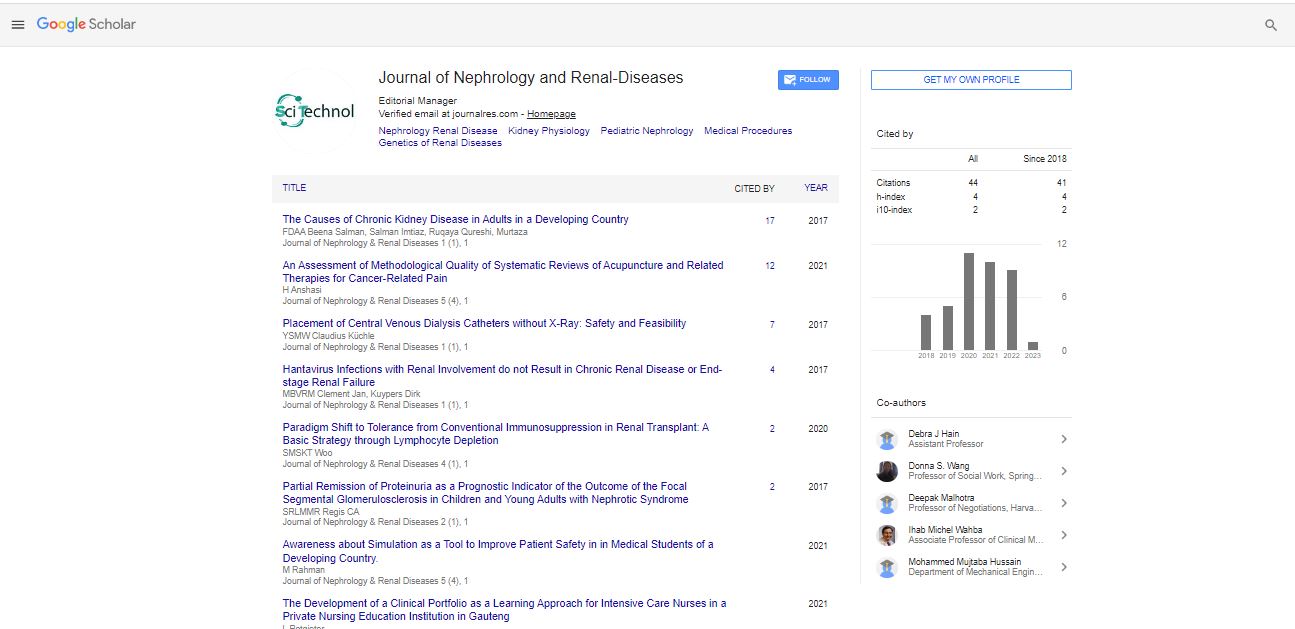Perspective, J Nephrol Ren Dis Vol: 7 Issue: 2
Assessing the Causes, Symptoms and Cure of Nephropathy
Goto Pang*
Department of Nephropathy, Henan University of Chinese Medicine, Henan, China
*Corresponding Author: Goto Pang,
Department of Nephropathy, Henan
University of Chinese Medicine, Henan, China
E-mail: gotopa@yeah.net
Received date: 22 May, 2023, Manuscript No. JNRD-23-107015;
Editor assigned date: 25 May, 2023, PreQC No. JNRD-23-107015 (PQ);
Reviewed date: 08 June, 2023, QC No. JNRD-23-107015;
Revised date: 15 June, 2023, Manuscript No. JNRD-23-107015 (R);
Published date: 22 June, 2023, DOI: 10.4172/2576-3962.1000037
Citation: Pang G (2023) A ssessing the Causes, Symptoms and Cure of Nephropathy . J Nephrol Ren Dis 7:2.
Description
Nephropathy refers to a group of kidney disorders characterized by structural or the functional abnormalities that result in kidney damage. It encompasses a wide range of kidney diseases that can have significant implications for an individual's health and quality of life. The pathogenesis of nephropathy involves various factors, including genetic predisposition, immune dysregulation, metabolic abnormalities and environmental influences.
Nephropathy can arise from multiple pathogenic mechanisms, each contributing to kidney damage. These mechanisms include immunemediated glomerular injury, vascular abnormalities, tubulointerstitial inflammation and metabolic derangements. In certain instances, genetic mutations can predispose individuals to specific types of nephropathy. Understanding these underlying mechanisms is essential for targeted therapeutic interventions.
Nephropathy encompasses several distinct types, each with its own clinical presentation, histological features and prognosis. Some common types of nephropathy include diabetic nephropathy, hypertensive nephropathy, glomerulonephritis, polycystic kidney disease and drug-induced nephropathy. Each type of nephropathy has unique pathophysiological features and requires specific diagnostic and management approaches.
Accurate diagnosis of nephropathy is essential for appropriate management and prognosis. Diagnostic evaluation may include a thorough medical history, physical examination, laboratory tests (including urine analysis, renal function tests and specific biomarkers), imaging studies (such as ultrasound or computed tomography) and renal biopsy in some instances. Specialized tests, such as genetic testing or immunological assays, may be necessary for certain types of nephropathy.
The management of nephropathy aims to slow down the progression of kidney damage, prevent complications and preserve kidney function. Treatment strategies are tailored to the underlying cause and may include lifestyle modifications (such as blood pressure control, glycemic control and dietary adjustments), pharmacological interventions (including antihypertensive agents, immunosuppressive therapy or targeted therapy for specific etiologies) and supportive care (such as managing fluid and electrolyte imbalances). In advanced stages of kidney disease, renal replacement therapies such as dialysis or kidney transplantation may be necessary.
Nephropathy is associated with a range of complications that can significantly impact patient outcomes. These complications include proteinuria, hypertension, electrolyte imbalances, anemia, bone disorders and cardiovascular disease. Early detection, appropriate management and close monitoring of these complications are important to minimize the impact on kidney function and overall health. The prognosis of nephropathy varies depending on the underlying cause, severity of kidney damage and response to treatment. Timely intervention and adherence to management strategies can improve long-term outcomes.
Ongoing analysis plays a vital role in advancing the understanding of nephropathy and identifying novel treatment strategies. Areas of focus include further elucidating the underlying pathogenic mechanisms, developing more sensitive diagnostic tools and biomarkers, and exploring targeted therapies to halt or reverse kidney damage. Additionally, research efforts aim to improve risk stratification, predict disease progression, and identify personalized treatment approaches.
Conclusion
To provide optimal care for patients with nephropathy, healthcare providers must have a comprehensive understanding of the pathogenesis, types of nephropathy, diagnostic methods, and management strategies. By utilizing evidence-based practices and continually expanding the knowledge, healthcare professionals can effectively handle the complexities associated with nephropathy. Through a multidisciplinary approach and ongoing advancements in the treatment modalities, healthcare providers can strive to improve patient outcomes, enhance quality of life and better manage the challenges presented by nephropathy.
 Spanish
Spanish  Chinese
Chinese  Russian
Russian  German
German  French
French  Japanese
Japanese  Portuguese
Portuguese  Hindi
Hindi 
